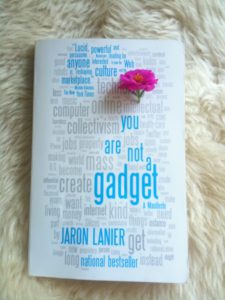For those of us in the “old media business,” it may be hard to see and understand why, how, and what is really happening around us in the digital “space.” If you want a clear, cold dose of reality (and I’m not talking virtual), read Jaron Lanier’s book You Are Not a Gadget. Jaron is the father of virtual reality, but what is most valuable are his insights into the very birth of this technological revolution, what the original motivations for it were, and how they have played out over time. Like a bitter, regretful revolutionary who is looking back on a long career of fighting, his insights are surprising to those of us who were “on the other side.” And they reveal so much more about humanity than I think we ever suspect when we turn on our gadgets every morning to check in with the world and confirm our existence.
In the beginning, there were a bunch of geeks who built software and technology that “locked in” a view of the world in which the primary fantasy is that one (in other words, YOU) can, and might very well be, replaced by an immortal, inhuman, and virtual substitute. (This is, in essence, the philosophy known as Singularity.) After all, humanity is messy, painful, and hard to control. Machines, on the other hand, can be controlled. Perhaps they can even be built to control themselves so that humanity becomes obsolete. Nature? Who needs it? Love? Who wants love when you can have unlimited porn? For free! The anonymity of the Web enables our worst selves to dominate (Trolls, he calls them). It sounds dark, and it is—driven by a deep fear of death, and even a fear of life and the pain of love. Perhaps the one original hope of these brilliant but emotionally sterile creators was that we could live in a world of unlimited content, without…advertising.
As Jaron says of the early days: “There was a discernible ambient disgust with advertising in an earlier, more hippielike phase of Silicon Valley, before the outlandish rise of Google. Advertising was often maligned back then as a core sin of the bad old-media world we were overthrowing. Ads were at the very heart of the worst of the devils we would destroy, commercial television.”
And yet now we know that advertisers are a lot more willing to pay for content than people are. And it’s the artists, writers, musicians, and journalists who have become impoverished.
Yes, I am writing this today without being paid, and with no real expectation of ever being paid. I am writing out of a pure love of writing and communicating. But that is not going to feed my family or send my daughters to college. That is why I have the day job of navigating an original “old media” company through the turbulent waters of this digital storm.
While the book sometimes smacks of the cynicism of an aging, disillusioned “old man” (Sorry, Jaron, but I disagree that no good new musical genres have been created since the invention of the Internet—punkgrass (Avett brothers!), modern country (Keith Urban!). Everything is an evolution—even “locked-in” technology.), it is ultimately a story of the possibility of change and hope. “We can make culture and journalism into second-rate activities, and spend centuries remixing the detritus of the 1960s and other eras from before individual creativity went out of fashion,” he complains. “Or we can believe in ourselves. By chance, it might turn out we are real.”
It’s that humanistic, optimistic, hopeful spirit that respects and understands the power of creativity that is required for our survival. Personally, I don’t want immortal life, I want a real, messy, nature-filled, love-obsessed, and un-singular life. And when it’s over, I’ll be ready to unplug. It turns out even people who aren’t religious fear death, and being disconnected and discontinued. Maybe that’s why religion was invented in the first place—to manage that fear. But if we can overcome that fear and look at where we are and who we are right now, I am convinced the world will be a much happier place. As Jaron says: “It turns out that even an optimistic, idealistic philosophy is realizable. Put a happy philosophy of life in software and it might very well come true!”





Just like any new drug, the internet world of endless information and entertainment has produced more than a few addicts. In the end it all works out to one degree or another. Some will learn how to enrich their lives with it, and use it for what it can be used for. Others will succumb to the false nirvana and become pitiful disgusting cyber-junkies. Brave new world here we come!
http://writersoftheriogrande.com
Great post! My current project has involved using social media to organize parents and teachers to join our national dialogue on education. For five months, I felt as if I lived in cyberspace, but now am beginning the process of actually meeting with real people and seeing things blossom on the ground! Balance is hard, but so worth it. I could never have learned so much or met so many people if I hadn’t spent so much time staring into the glowing box, but also glad I didn’t stay there.